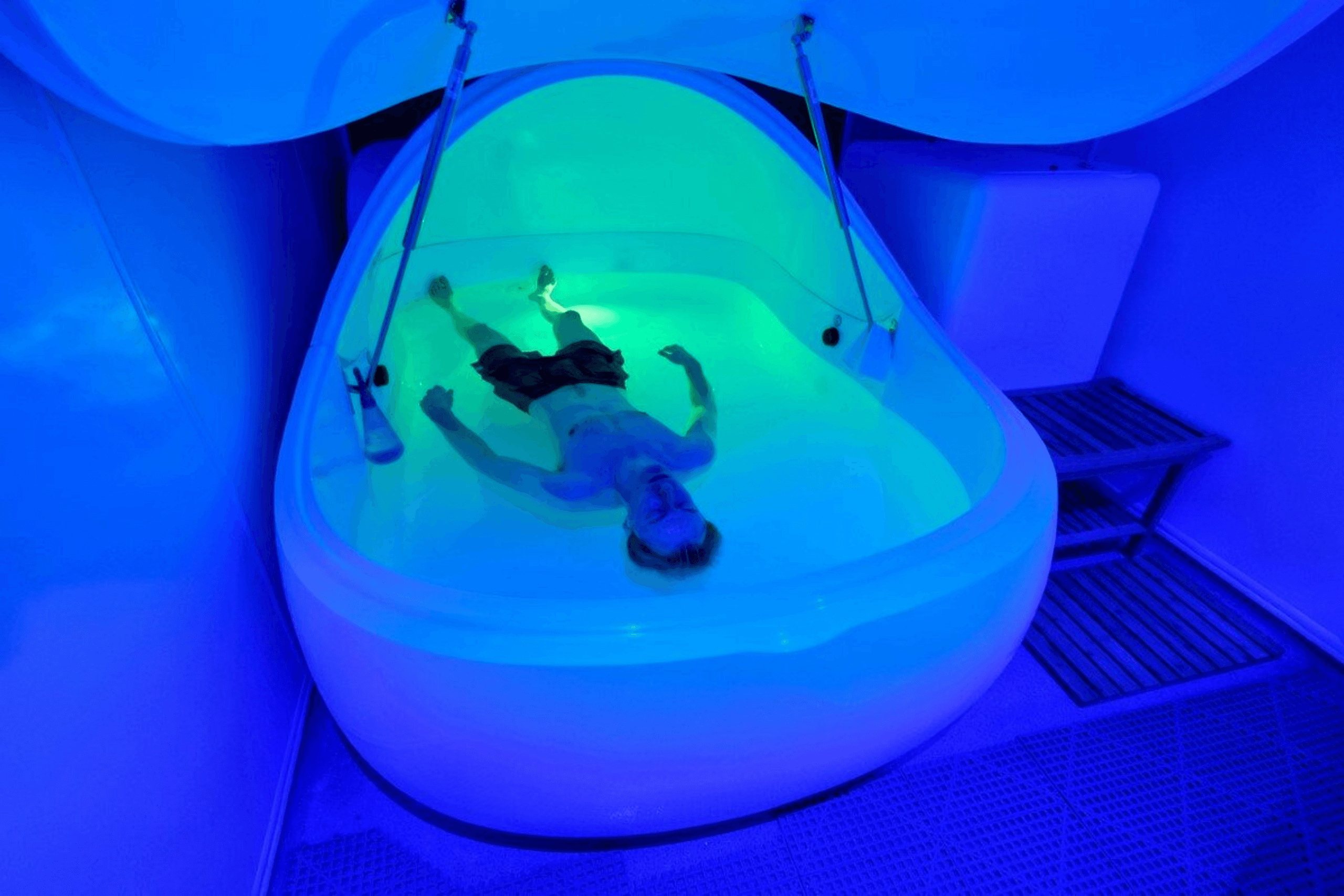In recent times, many people are looking for new ways to manage stress, improve their mental clarity, and enhance their overall well-being. One such option gaining popularity is float therapy. This unique experience involves floating in a tank filled with warm water and a lot of Epsom salt, which makes your body float effortlessly. The benefits of floatation tanks are plenty, from stress relief to better sleep, making it a great choice for those looking to relax and recharge.
Let’s explore the key health benefits of float therapy and understand why it’s becoming so popular.
What is Float Therapy?
Float therapy, also known as sensory deprivation or isolation tank therapy, involves floating in a special tank filled with water that has a high concentration of Epsom salt. The water is heated to match your body temperature, and the salt makes you float without any effort. The purpose of this therapy is to cut off all outside sensory input, like sound, light, and touch, which allows your body and mind to deeply relax.
The idea of float therapy was first introduced in the 1950s by Dr. John Lilly, a neuroscientist who wanted to study how isolation affected the brain. Over time, it has evolved into a widely used wellness treatment that helps people relax, recover, and recharge.
Reduces Stress and Improves Mental Clarity
One of the biggest benefits of float therapy is its ability to reduce stress. In today’s fast-paced world, many of us experience stress on a regular basis, which can lead to problems like anxiety, high blood pressure, and trouble sleeping. When you float in the tank, you disconnect from all the noise and distractions of daily life. This helps to calm your mind and relax your body, making you feel much more at ease.
The floatation tanks help reduce muscle tension by supporting your body in a weightless state. This allows your muscles and joints to relax completely. Floating also triggers the release of endorphins, which are chemicals that help you feel good, while lowering cortisol (the stress hormone).
How Float Therapy Helps Reduce Stress:
- Eases muscle tension: Floating helps relieve pressure on muscles and joints.
- Promotes relaxation: The tank helps calm your mind by eliminating outside distractions.
- Lowers stress hormones: Floating helps reduce cortisol levels in the body.
Helps You Sleep Better
Another great benefit of floatation therapy is its positive effect on sleep. Many people struggle with getting enough rest, whether it’s from stress, anxiety, or other health issues. Floating can help improve the quality of your sleep by reducing anxiety and balancing your body’s natural rhythms.
When you float, your body enters a relaxed state, which encourages the production of melatonin, the hormone that controls your sleep cycle. The calming effect of the therapy also helps your mind let go of any worries or racing thoughts, making it easier for you to fall asleep and stay asleep.
How Float Therapy Improves Sleep:
- Reduces stress: Floating helps you relax both physically and mentally, which can help you sleep better.
- Boosts melatonin: The therapy encourages your body to produce melatonin, making it easier to sleep.
- Improves sleep cycles: Floating helps restore your body’s natural rhythm, leading to more restful sleep.
Eases Pain and Aids Muscle Recovery
If you suffer from chronic pain or sore muscles, float therapy can be a helpful solution. The high concentration of Epsom salt in the water has natural anti-inflammatory properties, which can ease pain and stiffness in muscles and joints. The water’s buoyancy allows your body to float without pressure, giving your muscles a break and helping them recover faster.
Whether you are an athlete or just someone dealing with muscle soreness, float therapy can help promote healing and reduce pain, making it a great addition to your recovery routine.
How Float Therapy Helps with Pain and Muscle Recovery:
- Relieves muscle tension: The buoyancy helps take pressure off sore muscles and joints.
- Promotes healing: Floating encourages better blood circulation, which aids in muscle recovery.
- Reduces inflammation: The Epsom salt’s magnesium content helps decrease inflammation and pain.
Supports Mental Health
In addition to physical relief, float therapy can also support your mental health. Conditions like anxiety, depression, and PTSD can be challenging to manage, but floating has been shown to help reduce symptoms. The environment in the floatation tank promotes a deep sense of calm, which can improve your mood and reduce anxiety.
The sensory isolation helps quiet your mind and allows you to focus on your thoughts in a peaceful way, leading to greater emotional balance. This sense of mental clarity and relaxation is particularly helpful for those experiencing stress or mental health challenges.
How Float Therapy Benefits Mental Health:
- Improves mood: Floating encourages the production of serotonin and dopamine, chemicals that help regulate mood.
- Helps reduce anxiety: The calming effects of floating can help reduce feelings of stress and anxiety.
- Enhances mindfulness: Without distractions, you can gain better insight into your thoughts and feelings.
Helps Detoxify Your Body and Improve Skin Health
Another benefit of float therapy is its ability to help detoxify your body. The high concentration of Epsom salt helps flush out toxins by stimulating your lymphatic system. This process improves circulation and helps your body eliminate waste more effectively.
Magnesium, which is abundant in Epsom salt, can also be absorbed through the skin, offering benefits for your skin. Regular float sessions may help improve the appearance of your skin, leaving it healthier and clearer.
How Float Therapy Aids Detox and Skin Health:
- Stimulates detoxification: Floating helps your body eliminate toxins and waste more effectively.
- Improves skin clarity: The magnesium in Epsom salt can benefit your skin, helping to clear blemishes and improve texture.
- Enhances blood flow: Better circulation leads to healthier, more radiant skin.
Why Float Therapy is Great for Business Owners
If you’re a small to medium-sized business owner, marketing director, or part of a B2B company, float therapy can be an excellent addition to your wellness offerings. Introducing floatation tanks into your business could help improve employee well-being by reducing stress, increasing productivity, and boosting overall morale. Healthy employees are more engaged and motivated, which can ultimately lead to better business outcomes.
Offering float therapy services in your spa, health center, or wellness space can also attract new customers. By focusing on relaxation and mental health, you can set your business apart from the competition and create a unique, calming environment for your clients.
Conclusion
In summary, the health benefits of float therapy are vast and impactful. From reducing stress and improving sleep to aiding muscle recovery and supporting mental health, floatation tanks offer a full-body and mind experience that helps you feel better overall.
For those in the United States looking to experience the best in floatation therapy, Secret Soak Society provides therapy guidance that can help you relax and rejuvenate. Their state-of-the-art floatation tanks and professional team ensure that you receive the full benefits of each session, whether you’re looking to relieve stress, recover from pain, or just unwind.
FAQs
What is float therapy?
Float therapy involves floating in a tank filled with warm water and Epsom salt. This unique experience helps promote relaxation, reduce stress, and relieve pain.
How long does a float therapy session last?
Most float therapy sessions last 60 to 90 minutes, providing enough time for deep relaxation.
Are there any side effects of float therapy?
Float therapy is safe for most people, but if you have specific health concerns, it’s a good idea to talk to your doctor before trying it.
Can float therapy help with anxiety?
Yes, float therapy can help reduce anxiety by calming the mind and promoting relaxation.
How does float therapy help with muscle recovery?
The buoyancy in the water reduces pressure on muscles, helping them relax and recover. The magnesium in Epsom salt also reduces inflammation and aids healing.






